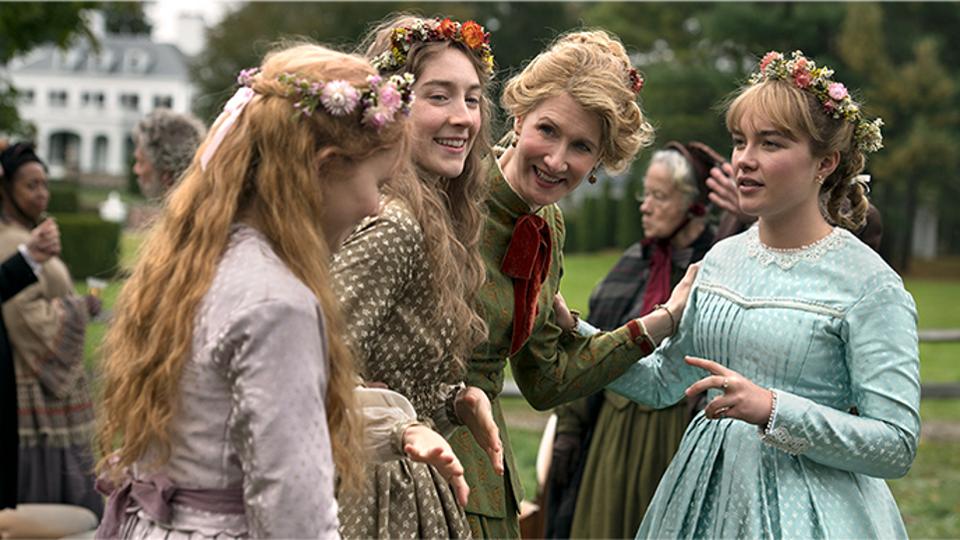Like many bookish women, part of my Christmas celebrations this year included an outing to see Greta Gerwig’s delightful take on Louisa May Alcott’s beloved novel, Little Women.
Much could, and likely has been, written about the film’s portrayal of women in the arts. More than any other version I’ve seen, this latest Little Women to grace the big screen brings to the foreground the diverse creative gifts the four March sisters possess: Jo’s writing, of course, but also Beth’s music, Amy’s painting, and (though it’s not given as much screen time) Meg’s ability to make a house of modest means a home.
The palpable intimacy these sisters share is certainly a part of the magic that captivates the men who inhabit the fringes of their world, but the way these four little life-givers come to view themselves as cultivators of beauty also seems to play a crucial role in making the March house a place of enchantment.
I cried throughout the movie, and then I cried afterward even more. Pregnancy hormones may be partly to blame for the excessive tears, but I knew this wasn’t simply an emotional response to having witnessed something beautiful. These tears were rooted in something far more melancholy.
When my husband asked what was wrong later that night, I rambled on a bit and eventually blurted out something about “no more unchartered horizons or new beginnings.” The prospect of marriage, becoming a mother, even the excitement of holding one’s published book for the first time—all emotional touch points highlighted in Little Women—were behind me.
“So you’re having a midlife crisis,” my husband said with a wry smirk before I threw a pillow at his head.
Only he wasn’t far from the truth. What Gerwig’s film brought to light—a detail that has never stood out to me so glaringly before—was the fact that Little Women, just like its title suggests, is about young women moving into adulthood, with all its major milestones and lofty dreams ahead of them. The nostalgia this evokes is surely a part of the story’s timeless charm, but as a strong-willed writer who had long identified with Jo (as many female writers do), I experienced a startling revelation in the aftermath of this latest film:
Most of those mountaintop moments were over. I was Marmee now. Only without her selfless patience, cheerful wisdom, and overall saintliness.
Both Susan Sarandon and Laura Dern have touching moments as the mother of the March girls in the two most recent movies, but Marmee’s identity and story have never been a major focus of film adaptations. To truly understand the role Marmee plays not only in her daughters’ lives, but in the lives of her neighbors and the story overall, you must turn to the novel itself.
In the past few months, I’ve asked fellow readers about where they’ve seen powerful portrayals of motherhood in literature, and two titles brought up often were Kristin Lavransdatter and Little Women—in fact, they were often the only titles mentioned. But why is this the case? Is motherhood rarely a theme explored in fiction because we expect our literary heroines to possess a potent agency, while a prominent feature of motherhood is it often involves a woman sacrificing her own dreams and desires—or at least some of them, some of the time—in order to give life to her children?
For me, that is how Marmee is a model of rest. A rest from ambition. A rest from striving. A rest from passing things so we can lift our eyes to the eternal. A rest from always looking ahead because the present demands everything a mother has already.
In this, Marmee may be the most Christ-like character in Little Women, the character who gives her time, her advice, and her affection not so her will might be done, but so her loved ones might flourish.
Did Marmee ever have hopes for her life as a cultivator of beauty just like her daughters do? Probably. We don’t know for sure, but there are hints in the novel that her girlhood temperament was much like Jo’s, the most spirited and independent of her children.
“Jo, dear, we all have our temptations, some far greater than yours, and it often takes us all our lives to conquer them,” Marmee tells her following the post-novel-burning outburst between Jo and Amy.
“You think your temper is the worst in the world, but mine used to be just like it.”
“Yours, Mother? Why, you are never angry!” And for the moment, Jo forgot remorse in surprise.
“I’ve been trying to cure it for forty years, and have succeeded in controlling it. I am angry nearly every day of my life, Jo, but I have learned not to show it, and I still hope to learn not to feel it, though it may take me another forty years to do so.”
But how, exactly, does Marmee keep her temper from leading her to “rash words…like sword thrusts” (Proverbs 12:18, ESV)?
“…when I feel that they [hasty words] may break out against my will, I just go away for a minute,” she tells us. (Emphasis mine.)
In other words, to fight against sin, Marmee seeks out rest. To become more like Christ, she willingly steps away from the Hollywood spotlight and accepts the quiet, encouraging work she must do in the background of her daughters’ lives.
Jo will always be my favorite March sister. But there would be no Jo without her mother, a woman who welcomed a respite from the illusion of perpetual youth and the tireless pursuit of Self—a message we need to be reminded of today more than ever. Marmee did not lose her life in the outpouring of herself for others; she found it.
And that is a work of art.
Ashlee Cowles is the author of Beneath Wandering Stars and Below Northern Lights. She writes about motherhood as creative magic at The Most Creative Thing.
Leave a Reply
A Field Guide to Cultivating ~ Essentials to Cultivating a Whole Life, Rooted in Christ, and Flourishing in Fellowship
Enjoy our gift to you as our Welcome to Cultivating! Discover the purpose of The Cultivating Project, and how you might find a "What, you too?" experience here with this fellowship of makers!


Beautifully captured Ashlee! Now I must go read the novel as I have yet to do so but have seen both movies.